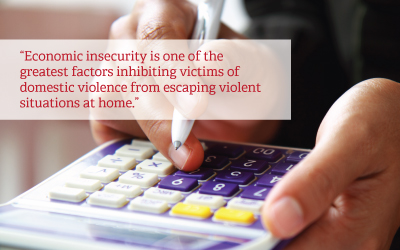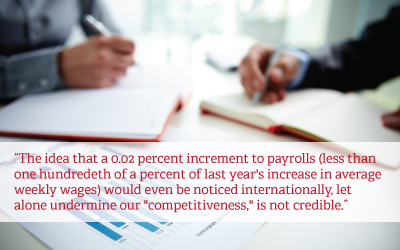Economic Benefits of Paid Domestic Violence Leave

Dr. Jim Stanford is Economist and Director of the Centre for Future Work, based at the Australia Institute.
Jim recently relocated to Sydney, Australia from Toronto, where he is one of Canada's best-known economic commentators. He served for over 20 years as Economist and Director of Policy with Unifor, Canada's largest private-sector trade union (formerly the Canadian Auto Workers). He still advises the union, and is also the Harold Innis Industry Professor in Economics at McMaster University in Hamilton, Canada (fractional appointment). He is also an Honorary Professor of Political Economy at the Department of Political Economy at the University of Sydney.
Jim received his Ph.D. in Economics from the New School for Social Research in New York. He also holds an M.Phil. from Cambridge University, and a B.A. (Hons.) from the University of Calgary.
Learn more about his work here.
Originally posted December 22, 2016 by Jim Stanford on the website of The Centre for Future Work, an initiative housed within the Australia Institute
Economic insecurity is one of the greatest factors inhibiting victims of domestic violence from escaping violent situations at home. To address that problem unions and employers have developed paid domestic violence leave provisions which allow victims to attend legal proceedings, medical appointments, or other events or activities related to the violence they have experienced, without risk of lost income or employment. Proposals have now been made to extend that provision to more Australian workers, by including a paid domestic violence leave provision in the Modern Awards (presently being reviewed by the Fair Work Commission), and/or by including it as a universal entitlement under the National Employment Standards.

This report considers the likely impact of such an extension on the payroll costs of employers, and finds it to be so small it would be difficult to measure: we estimate that incremental payments to workers taking the leave would amount to one-fiftieth of one percent (0.02%) of current payrolls.
These findings refute recent statements by Commonwealth Finance Minister Mathias Cormann, who recently described domestic violence leave as “another cost on our economy that will have an impact on our international competitiveness.” His government has opposed extending the provision -- at least not until the Fair Work Commission has completed its review.

The idea that a 0.02 percent increment to payrolls (less than one hundredeth of a percent of last year's increase in average weekly wages) would even be noticed internationally, let alone undermine our "competitiveness," is not credible. Worse yet, this argument misunderstands the nature of competitiveness in a modern, innovation-driven economy. Cementing a reputation as a safe, high-quality, inclusive place to live is beneficial to national competitiveness, and paid leave for victims of domestic violence would be an important symbol of Australia's commitment in that regard.






